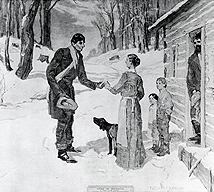LINCOLN
On May 7, 1833, 24-year-old Abraham Lincoln was appointed postmaster of New Salem, IL. Lincoln served until the office was closed May 30, 1836.
Two postmasters became U.S. presidents later in their careers — Abraham Lincoln and Harry Truman. Truman held the title and signed papers but immediately turned the position and its pay over to an assistant. Lincoln was the only president who served as a postmaster.
On May 7, 1833, 24-year-old Lincoln was appointed Postmaster of New Salem, IL. Lincoln served until the office was closed May 30, 1836. Postal records show that Lincoln earned $55.70 as postmaster in fiscal year 1835 and $19.48 for one quarter’s work in fiscal year 1837. Besides his pay, Lincoln, as postmaster, could send and receive personal letters free and get one daily newspaper delivered free. Mail arrived once a week. If an addressee did not collect the mail, as was the custom, Lincoln delivered it personally — usually carrying the mail in his hat. Even then, Lincoln was “Honest Abe.”
Reportedly, when the New Salem Post Office was discontinued, Lincoln had a balance of $16 or $18, which he took with him to Springfield, IL. Months later, while his close friend Dr. A. G. Henry was visiting, a Post Office agent called on Lincoln to collect the funds. Henry knew that Lincoln had been in financial straits and feared that he might not have the money. Henry recalled that just as he was about to offer Lincoln a loan, the future president “. . . went over to his trunk at his boarding house, and returned with an old blue sock with a quantity of silver and copper coin tied up in it. Untying the sock, he poured the contents on the table and proceeded to count the coin, which consisted of such silver and copper pieces as the country-people were then in the habit of using in paying postage. On counting it up there was found the exact amount, to a cent, of the draft, and in the identical coin which had been received. He never used, under any circumstances, trust funds.”


